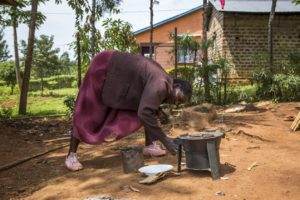Rural Kenyans to enjoy smart stoves and healthier homes
EnergyPress release
Nairobi, Kenya – September 2021
A project which will help bring thousands of environmentally friendly cook stoves to rural Kenya has been launched by Practical Action.
More than 150,000 households will enjoy improved health and income as a result of replacing traditional wood-based fires with more efficient cook stoves.
The project will also protect trees in remote rural areas through a reduction in the demand for wood for cooking.

The introduction of improved cookstoves reduces deforestation and increases life expectancy for women.
This will substantially reduce greenhouse gas emissions, deforestation and protect ecosystems.
This project will work with suppliers, especially women operating in remote areas to help them install and distribute cook stoves.
Kenya has seen a steady advancement in the improved cook stove sector, which has resulted in increased investment and increased access to better cookstoves in most urban areas. However, there remains a gap in access for remote rural communities as a result of a lack of distribution.
Millicent Okello, Energy Program Manager for Practical Action in East Africa, said: “This is an exciting project which builds on Practical Action’s decade of experience operating in the clean-cooking sector both in Kenya and around the world. We will be working with last-mile distributors operating with remote communities to show that clean cooking can be achieved in all markets and at scale.”
Faith Temba, Energy Advisor said: “Last Mile Entrepreneurs are critical in filling this gap and shortening of supply chains of improved cook stoves to reach the targeted customers. Through this project, entrepreneurs’ capacity will be strengthened so we can increase demand for them.”
The project will operate in in Nakuru, Nyandarua and selected areas in Kericho and Baringo Counties.
The project is funded under the GCF/EnDev Programme, ‘Promotion of Climate-Friendly Cooking in Kenya and Senegal’, which seeks to benefit more than 11 million people, including 610,000 women-headed households and 5.57 million children by significantly reducing consumption of non-renewable biomass in the cooking sector.
This will lead to greenhouse gas emission reductions of 6.47 Mega tonnes of CO2 equivalent during the project period.
For more information, please contact
Onyango Rachael
Head of Business Development, Communications and Marketing
Practical Action East Africa
Email: [email protected]